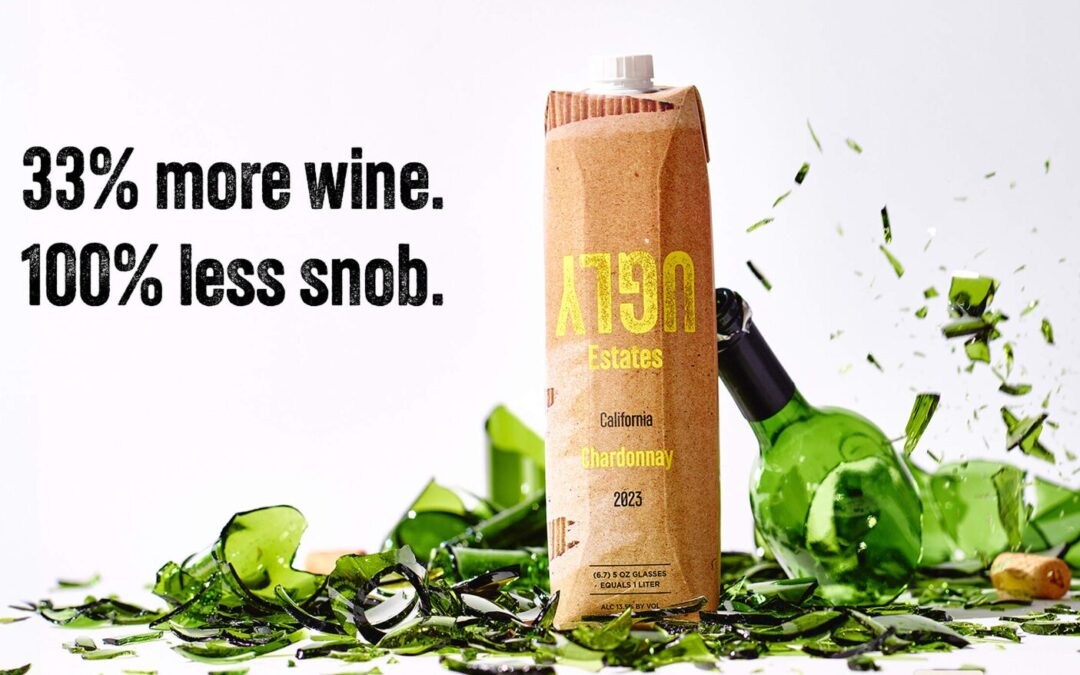The Beauty of Ugly Estates: How Ryan Reynolds and Gallo’s Collaboration Breaks All Wine Industry Rules
Gallo and Ryan Reynolds have chosen a different path in an industry steeped in tradition and elegance, where labels boast prestigious vineyards and centuries-old heritage.
Their new collaboration, aptly named “Ugly Estates,” stands as a testament to the power of understanding the conventions of a category and doing the opposite of what you should do.
I am a brand strategist who has witnessed countless product launches across various sectors; this partnership is particularly fascinating because it is willing to challenge every unwritten rule in the wine category’s playbook. The strategy is refreshing because it recognizes that most consumers think wine drinking is filled with ridiculous snobbery and elite behavior, so give a quality product with more value (extra 33%) without the pretentiousness.
The Traditional Wine Playbook
The wine industry has operated on a well-established set of principles for generations. Vineyard pedigree matters, vintage years matter, elaborate descriptions of notes and undertones matter, and elegant bottles with sophisticated labels matter. The entire experience is designed to feel exclusive, refined, and sometimes intimidating.
Lately, this approach has been failing to grow the category which is essential if you want to have new consumers drinking wine.
Traditional wine marketing embraces:
- Heritage and history
- Sophisticated imagery and language
- Exclusivity and expertise
- Price as a quality indicator
- Reverence for tradition
These elements have become so ingrained that they represent the expected formula—rules no serious wine brand would dare break.
Enter Ugly Wine: The Category Disruptor
Gallo, a wine industry giant with deep market knowledge, and Ryan Reynolds, already a master of category disruption through his work with Aviation Gin, Mint Mobile and Rexham AFC, have created something that deliberately breaks every wine industry convention.
What makes Ugly Wine so fascinating is that it’s not just another celebrity wine brand; it’s a calculated dismantling of category norms. This collaboration embraces an anti-elegance stance that feels authentic rather than gimmicky, mainly due to Reynolds’ trademark self-deprecating humor and Gallo’s willingness to play against type.
Embracing Imperfection
Ugly Wine celebrates imperfection in a category where brands spend millions projecting perfection. The name itself directly challenges the industry’s obsession with beauty and refinement. While other wines boast about their “beautiful bouquet” or “elegant finish,” Ugly Wine proudly wears its unconventional character as a badge of honor.
This approach mirrors Reynolds’ brand persona: authentic, unvarnished, and refusing to take itself too seriously. It’s the antithesis of the polished celebrity endorsement, instead embracing the messy reality that sometimes, things don’t need to be pretty to be good.
Transparency Over Mystique
Wine has traditionally thrived on mystique.
Elaborate descriptions, foreign terminology, and complex rating systems all create barriers to entry that can make everyday consumers feel inadequate. Ugly Wine strips away these pretensions with plain-speaking labels and marketing, prioritizing honest communication over flowery language.
This transparency extends to the product development narrative as well. Instead of fabricating tales of Reynolds wandering through vineyards at dawn, the collaboration openly acknowledges its commercial nature while preserving an authentic connection between the celebrity and the product.
Accessibility as a Virtue
Perhaps most disruptively, Ugly Wine positions accessibility as a virtue rather than a compromise.
While traditional wine marketing often (or not so subtly) suggests that quality correlates with exclusivity and price, Ugly Wine proudly offers quality without the elitist trappings.
This democratization of wine aligns perfectly with shifting consumer values. Today’s consumers, particularly younger ones, often reject artificial barriers to entry and appreciate brands that invite them into experiences without judgment or pretension.
The Strategic Brilliance Behind the Disruption
Upon closer inspection, What appears to be simple contrarian reveals itself to be strategic brilliance. By doing the opposite of category conventions, Gallo and Reynolds have achieved several critical brand objectives:
Immediate Differentiation
Ugly Wine instantly differentiates in a crowded market where thousands of labels compete for attention. The concept is so contrary to category norms that it demands notice, cutting through the noise of similar-looking wine brands with their interchangeable stories of heritage and craftsmanship.
Alignment with Cultural Currents
The timing of this disruption is impeccable. We live in an era where authenticity trumps perfection, and consumers are increasingly skeptical of overly polished brand presentations. Ugly Wine taps into broader cultural movements celebrating realness, vulnerability, and the beauty of imperfection.
Leveraging Complementary Brand Equities
Reynolds brings his irreverent, self-deprecating brand persona to the table, while Gallo contributes its wine-making expertise and distribution power. The collision of these seemingly contradictory forces—Hollywood star power and traditional wine industry clout—creates a tension that makes the disruption credible rather than merely provocative.
The Playbook for Category Disruption
Analyzing the Ugly Wine launch offers valuable insights for any brand looking to disrupt category conventions:
Identify the Sacred Cows
Successful category disruption begins with identifying the unwritten rules and conventions that competitors slavishly follow. These included emphasizing beauty, tradition, and exclusivity for wine—all targets for Ugly Wine’s counternarrative.
Flip the Script Authentically
The key to effective disruption isn’t just doing the opposite; it’s doing the opposite in a way that feels authentic to your brand equities. Reynolds’ established persona made the irreverence of Ugly Wine feel natural rather than forced. Without this authenticity, category disruption risks becoming a desperate attention grab.
Deliver Substance Behind the Disruption
Critical to Ugly Wine’s success is that beneath the provocative concept lies a quality product. Gallo’s winemaking expertise ensures the wine delivers, preventing the collaboration from being dismissed as mere novelty. True disruption isn’t just about challenging marketing conventions—it’s about challenging the assumption that those conventions are necessary for quality.
The Legacy of Ugly Wine
Whether Ugly Wine becomes a long-term success story or a fascinating case study in momentary disruption remains to be seen. However, its impact on the wine category is already significant. Reynolds and Gallo have created space for more innovative approaches in this traditionally conservative industry by challenging the fundamental assumptions about how wine should be presented and marketed.
The collaboration reminds us that no category is too established for disruption and that sometimes, the most powerful strategy is to identify what everyone else is doing and do precisely the opposite.
Key Takeaways
- Identify and invert category conventions: True disruption comes from understanding your category’s unwritten rules and deliberately subverting them. Map out competitor commonalities and ask which could be inverted without compromising product quality.
- Authenticity trumps shock value: Successful category disruption requires alignment with authentic brand values. Reynolds’s irreverent persona made Ugly Wine’s approach credible rather than provocative.
- Substance must support style: Behind every disruptive brand presentation should be a quality product or service that delivers. Gallo’s winemaking expertise ensures Ugly Wine backs up its provocative positioning with genuine quality, preventing it from being dismissed as a gimmick.
This is an ugly and beautiful idea. Both things can be true.
Connect with Jeff at The Marketing Sage Consultancy. Interested in setting up a call with me? Use my calendly to schedule a time to talk. The call is free, and we can discuss your brand and marketing needs.
If you want to learn more about my new offering, The Trusted Advisor Board, you can click here to learn the details. Feel free to email me at jeffslater@themarketing sage.com or text 919 720 0995. Thanks for your interest in working with The Marketing Sage Consultancy.





